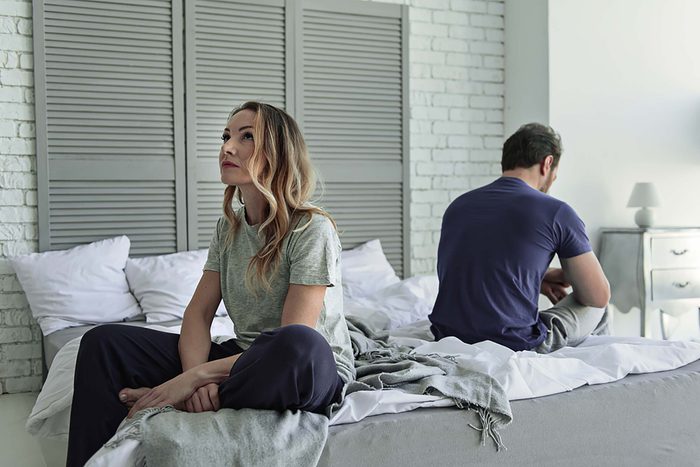
Someone you know could be suffering from domestic violence
Domestic violence is far more common than most of us realize—about 20 people per minute suffer abuse, on average, according to the National Coalition Against Domestic Violence (NCADV). Although women are more likely to experience abuse from an intimate partner, at an incidence rate of one in four, men can also be victims: About one in nine men are abused. For nearly all relationships in which domestic violence occurs, the abuse can remain hidden until later in the relationship. “It is not uncommon for a victim to confide that he or she ‘woke up one day’ to realize—with deep embarrassment and shame—that he or she was in the midst of an abusive relationship,” explains Carla Manly, PhD, a clinical psychologist and author of Joy from Fear. The warning signs of domestic violence, however, can appear early on in a relationship—sometimes even from the start. Here, experts of domestic violence unveil some of the behaviors that indicate a relationship might turn abusive.

Your partner forces you into decisions without regard for your feelings
This type of behavior, be it forcing you to move in together prematurely or get married before you’re ready, can signal the potential for an abusive relationship, according to Kendra Kubala, a psychologist in Philadelphia, Pennsylvania. “The abusive partner may cause the other partner to feel guilty or ungrateful for asking questions or asking to slow the pace of the relationship,” she says. Here’s how to improve communication in your relationship.

Your partner’s alarmingly controlling
Controlling or overprotective behavior from one partner is a reliable indicator that a relationship could turn abusive. If your partner asks you where you go, starts timing your absence from the house, or inquires about your whereabouts during the day, he or she may some issues with control and may be insecure, warns Rudi Rahbar, a clinical psychologist who specializes in couples and families. You might be experiencing gaslighting—here’s how to tell.

Your partner’s previous relationships were always a “problem”
If the person you’re in a relationship with characterizes all their past partners as unfeeling, unreasonable, selfish, crazy, addicted, or just mean—and it was always the other person’s fault for the breakup—watch out. If your date takes no responsibility, says Tina B. Tessina, PhD, a psychotherapist and author of How to Be Happy Partners, warns that you could be the next one on that list. “Every relationship disaster takes two,” she says. “A healthy person does make mistakes, and people in relationships can grow apart, but your date should know what he or she could have done better.” Look out for these bad relationship habits so you can avoid them.

Your partner doesn’t have a social life
If your partner doesn’t seem to have any friends or family members with whom he or she socializes regularly, be wary. A particularly bad sign can be that your partner blames the lack of a social life on their devotion to you. “It may mean your date has problems relating to people, and you’ll soon feel pressure to fill up your date’s life,” Dr. Tessina explains.

You constantly feel like you’re walking on eggshells
You should feel happy and at ease with your significant other—not always worried that he or she will be upset or disappointed with you. “If you feel the latter, you are likely to be in a relationship with someone who is insecure, has anger management issues and is controlling,” says Dr. Rahbar. “An abuser often creates such a hostile, unpredictable environment that the abused person feels extremely unsafe and on edge.”

Your partner explodes in anger often
“An explosive, impulsive, and intimidating interactional style may warn of domestic violence tendencies, explains Mayra Mendez, PhD, a licensed psychotherapist and program coordinator for intellectual and developmental disabilities and mental health services at Providence Saint John’s Child and Family Development Center in Santa Monica, California. “When expression of anger and aggression are in response to intolerance to differing opinions, thoughts, beliefs, or points of view, this is a warning sign of possible domestic violence tendencies.” Be aware of these gaslighting phrases that could raise a red flag for your relationship.

You’re always wrong in every situation
Relationships are all about compromise. When disagreeing, sometimes you will be right and other times your partner will be right. But if your partner tries to convince you that you are wrong all of the time, it’s often in an attempt to gain power and control over you and cause you to doubt yourself. “A lack of personal responsibility is a key factor in domestic violence,” says Dr. Manly. “A lack of insight and personal awareness is often an underlying issue, yet sometimes the abuser is acutely aware of the tactics being used.” Read these secrets of a happy marriage from real couples.

Your partner is extremely jealous
While jealousy is a normal emotion, it becomes unhealthy when it is extreme. “When a partner tries to control you and lashes out you due to jealousy this can lead to an escalation in the future,” warns Rachel Needle, a psychologist and certified sex therapist in West Palm Beach, Florida, and co-director of Modern Sex Therapy Institutes. “If a partner becomes possessive and gets upset when you talk to or spend time with other people, makes accusations of you lying or cheating or getting too close to someone, let this be a red flag to you.”

The sex is forceful and always rough
While occasional rough sex isn’t an issue so long as both partners are consenting, sex that is often aggressive and leaves you bruised is a warning sign of an abusive relationship, stresses Dr. Rahbar. “If you are engaging sex against your wishes or being raped, then you are definitely in a cycle of domestic violence—and yes this can happen in a marriage,” she adds. Here’s how one sexual abuse survivor found peace.

Your partner is an angry drunk
Pay close attention to happens to your partner’s personality when he or she drinks. Are they a happy drunk or do they start picking fights? “If you find yourself shuddering when your partner picks up a drink, then maybe it’s time to take a look at how your partner’s behavior when they are intoxicated,” says Dr. Rahbar. “If he or she becomes violent and aggressive it is a warning sign that more is to come.”

You fear for your safety
It’s important to pay close attention to your own thoughts and feelings about the relationship that you’re in. If it does not feel equitable, it is likely not a viable or healthy relationship, according to Dr. Mendez. “Have confidence in your existence and know that you are a valuable and equal contributor to the relationship,” she says. “Talk to trusted others about your concerns and stand up for yourself.” Learn home security tips that could save you from a break-in.

Your partner tries to alienate you from loved ones
If your partner always seems to have a say in which close family and friends you see, how often, and for how long, this is an attempt to gain control and power over you. “Abusers often gain control in the relationship by cutting off the victim’s friendships and outside relationships,” explains Dr. Manly. “Sadly, the abused person often becomes so embarrassed that she or he will self-isolate in order to keep friends and family from learning about the destructive nature of the relationship.”

Name-calling is a common occurrence
Does your partner often belittle you in the form of name-calling and humiliation? These are not signs of a healthy relationship, warns Dr. Kubala. While the commentary may begin as seemingly harmless jabs or jokes, they can evolve to full-blown criticism. “If the abusive partner excuses his or her attacks as jokes and insists that you are over-sensitive, this is a sign that your comfort is not important to him or her,” she says. These compliments are actually pretty insulting.

You’re fearful of leaving the relationship
If your partner makes it difficult for you to imagine leaving the relationship because you worry that he or she will hurt themselves, it’s a warning sign of abuse. “Watch out for such statements, as they are manipulative and meant to draw on your sympathy,” says Dr. Esfahani. “Remind yourself that this individual will be able to survive without you, this is the time to be selfish.” These abusive relationship quotes will help you leave and heal.

Your partner has a history of abuse
Any past that involves cruelty to others—be it an ex, a pet, or a perfect stranger—is a sign that it can happen to you. Also, says Dr. Kubala, pay close attention to over-reactions to seemingly small irritations, as this may shed light on a person’s inability to manage their emotions—and that can worsen over time. (Here’s how to leave an abusive relationship and keep yourself safe.)
If you’re in an abusive relationship, consider calling the National Domestic Violence Hotline at 1-800-799-7233.

